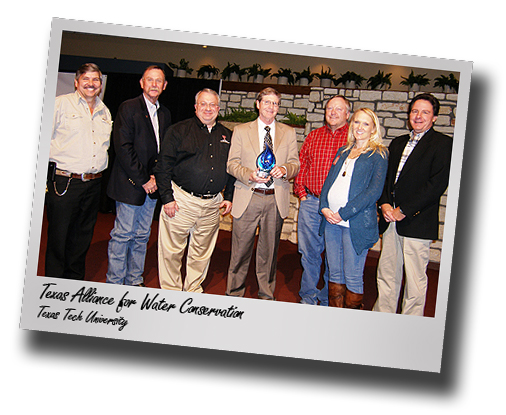TAWC Receives 'Save Texas Water Blue Legacy Award' from Advisory Council

The Texas Alliance for Water Conservation (TAWC), a research project made up of producers, industries, universities, and government agencies, recently received the Save Texas Water Blue Legacy Award in Agriculture from the Water Conservation Advisory Council. Charles 'Chuck' West, who serves as Texas Tech University's Thornton Distinguished Professor of Forages, accepted the award on behalf of the project at the Texas Commodity Symposium on Nov. 28 held in conjunction with the Amarillo Farm and Ranch Show.
The Texas Alliance for Water Conservation began in 2005 and was made possible by a grant from the Texas Water Development Board. The project uses on-farm demonstrations of cropping and livestock systems to compare the production practices, technologies, and systems that can maintain individual farm profitability while improving water use efficiency with a goal of extending the life of the Ogallala Aquifer while maintaining the viability of local farms and communities.
"We are greatly honored to receive this award," said TAWC Project Manager Rick Kellison. "Everyone involved in the TAWC project continuously puts forth great effort in our quest to determine the best management practices for managing our water."
Approximately 30 farms encompassing 4,500 acres through Hale and Floyd County demonstrate key comparisons of many production systems currently found in the Texas High Plains. These include monoculture cropping systems, crop rotations, no-till and conventional tillage practices, land application of dairy manure, and fully integrated crop and livestock systems. All production-related decisions are made by the more than 20 producers involved in the TAWC project.
Crops including cotton, corn, sorghum, wheat, triticale, alfalfa and perennial grasses are all grown and have been evaluated within the project. Irrigation delivery systems used include center pivot irrigation, subsurface drip, flood, and dryland. TAWC sites are being intensely monitored for water use, soil moisture depletion, crop productivity, and economic return.
Each site is equipped with instruments to determine total water applied from the aquifer, solar radiation, temperature, rainfall, timing, amount of irrigation events, and soil moisture. Integrated central processing controller equipment is being utilized to record, store, and transmits these data to a single database accessible to project participants.
The roles of the collaborating partners include installing and monitoring the data collection technologies, documenting the production-related activities used, developing economic models that evaluate the various systems, and conducting educational and communication projects designed to share the activities and outcomes of the project with others.
According to the council, award winners were selected based on their demonstrated willingness and commitment to incorporate water conservation practices into their operations as well as their leadership in furthering water conservation in their communities or within the industry. This year's award selection committee consisted of Water Conservation Advisory Council members representing the Texas Farm Bureau, Texas Department of Agriculture, Texas State Soil and Water Conservation Board, and the U.S. Department of Agriculture""Natural Resources Conservation Service.
Written by Samantha Borgstedt
CONTACT: Rick Kellison, Texas Alliance for Water Conservation Project Manager, Texas Tech University at (806) 742-2774 or rick.kellison@ttu.edu
1214NM12
Davis College NewsCenter
-
Address
P.O. Box 42123, Lubbock, Texas 79409-2123, Dean's Office Location:Goddard Building, Room 108 -
Phone
(806)742-2808 -
Email
kris.allen@ttu.edu
